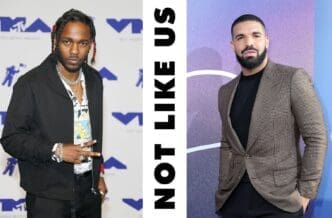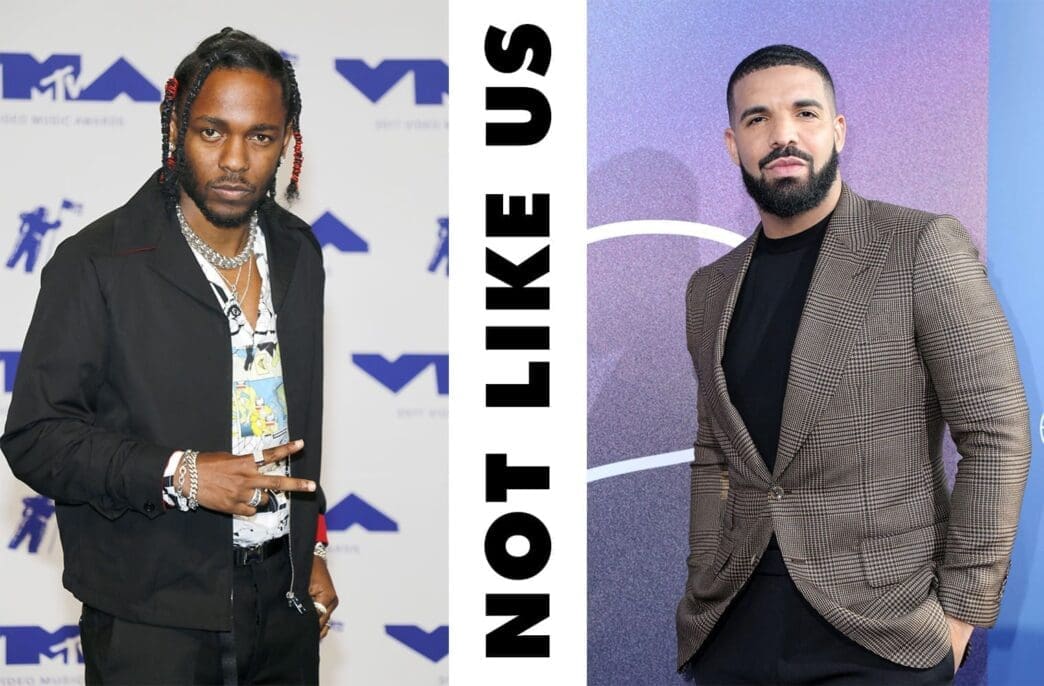Few Super Bowl halftime shows have reached the same level of anticipation as Kendrick Lamar’s explosive performance. The Grammy-winning rapper, fresh off his critically acclaimed album GNX, used the platform to not just entertain, but to ignite one of the most intense rap feuds we’ve seen in recent memory. In 2024, as hip-hop fans rejoiced over Lamar’s electrifying presence, tensions boiled over into a public spat with none other than Drake, an artist who reigns supreme in the charts and hearts of listeners worldwide.
Statistics reveal that Drake holds the record for the most Billboard Hot 100 hits of all time, while Kendrick Lamar has received an astonishing 20 Grammys and remains a lyrical titan. Yet, despite their respective accolades, their rivalry has captivated fans—not only for the music but for the serious implications surrounding it, including a defamation lawsuit that has rattled the foundations of the music industry. Let’s dive deeper into this saga that continues after Super Bowl 2025, examining the intricacies of their beef, the lawsuit that ensued, and what it all means for the future of hip-hop.
The Prelude: A Friendship Turned Sour
History of Collaboration
Kendrick Lamar and Drake’s relationship began in a harmonious space, marked by mutual respect and collaboration. They teamed up on various occasions, showcasing their chemistry through songs that resonated with fans, providing glimpses into their artistic synergy. However, as both artists climbed the ranks of the hip-hop hierarchy, the pressure of competition began to strain their bond.
In the early 2010s, they appeared united in the quest for musical excellence, but unspoken tensions simmered beneath the surface. As both artists rose to stardom, the expectations and stakes grew, leading to misunderstandings and perceived slights that would later contribute to their rivalry. Some fans sensed this shift and started to pick sides, setting the stage for what would eventually explode into a public feud.
The Spark of Animosity
The turning point came with the release of Kendrick Lamar’s track “The Heart Part 4” in 2017, where he indirectly called out Drake, questioning the authenticity of his lyrics and persona. Lamar’s frustration about the changing landscape of hip-hop and commercialism was palpable. Fans speculated that this was a shot fired directly at Drake, who was often criticized for valuing chart success over cultural impact.
Though the artists appeared to keep their disdain under wraps for a few years, the tension was undeniable. As both rappers continued to thrive, the industry buzzed with anticipation about a possible lyrical confrontation. This anticipation transformed into reality, culminating in a battle of wits and words that would have major consequences.
The Diss Tracks: An Exposé of Rivalry
Kendrick’s Like That
Fast forward to 2024, Kendrick Lamar unleashed “Like That” in March, the first major offensive in this latest chapter of their feud. The song was well-received by critics and fans alike, showcasing Lamar’s intricate lyricism and biting commentary. Through clever wordplay and sharp jabs, Kendrick hinted at Drake’s persona and questioned his credibility in the industry.

In “Like That,” Lamar artfully navigates themes of authenticity and respect in hip-hop. Lines that reference Drake’s previous work, namely *Certified Lover Boy*, subtly expose cracks in the veneer of Drake’s public image. Lamar’s masterful storytelling and lyrical prowess not only elevated the track but also re-ignited fan debates about who truly reigns supreme in the genre. The track was a precursor, a warning shot that set the stage for even more incendiary exchanges.
The Bombshell: Not Like Us
May 2024 saw Kendrick release “Not Like Us,” the track that would become infamous for its bold allegations against Drake. Lamar accused Drake of gravely serious misconduct in a way that not only shocked fans but sent ripples throughout the music industry. The song served not only as a personal attack but also commented on broader societal issues regarding accountability and the abuse of power.
[instagram-embed-display instagram_id=’DFLjy93z3_m’]
Lamar’s accusations were both direct and insinuative. With lines that drew parallels between Drake’s persona and serious allegations of inappropriate behavior, fans and critics were left reeling. The track’s biting lyrics struck a chord, forcing listeners to reconsider their perceptions of the two artists. For many, this was not merely a beef, but an indictment of hip-hop culture itself, raising important questions about ethics, accountability, and the cost of fame.
The Legal Firestorm: Drake’s Defamation Lawsuit
The Lawsuit Unveiled
The conflict reached a boiling point when Drake sued Universal Music Group (UMG) in late 2024, claiming that the label failed to prevent the release of “Not Like Us,” which he alleged contained defamatory content. In his complaint filed in a Manhattan federal court, Drake took his case to a legal arena, arguing that UMG not only allowed but promoted a song that could severely damage his reputation and safety.
Drake launched serious allegations, stating that the song insinuated he was a “criminal pedophile.” This disturbing claim was not only damaging but also posed a threat to his personal safety, as Drake revealed he had experienced attempted break-ins since the song’s release. The lawsuit illuminated the severe implications of their feud, bringing elements of personal safety into a realm often reserved for artistic expression.
The Response from UMG
UMG sprang into action, asserting that the lawsuit was an attempt by Drake to “weaponize” the legal process. They argued that silencing Kendrick’s creative expression was against the ethos of their industry. UMG maintained that it would be illogical to harm Drake’s image, especially after investing significantly in his career.
As the legal battle commenced, UMG highlighted that Drake was attempting to stifle Lamar due to his discomfort with the content of the track. This response solidified the divide—while Drake sought legal justice, UMG advocated for artistic freedom, complicating the narrative further. As the court case progressed, it became increasingly clear that this feud extended beyond personal grievances, shedding light on the larger dynamics at play in the music industry.
The Fallout: Social Media and Public Opinion
Fan Reactions
The feud between Drake and Kendrick has polarized fans. Social media has become a battleground where supporters of both artists vocalize their opinions through memes, tweets, and elaborate discussions. Some side with Drake, arguing that he is a victim of slander, while others champion Kendrick, seeing him as a warrior for authenticity in a commercialized industry.

Platforms like Twitter and TikTok have amplified every jab and counter-jab, making it impossible to ignore the seismic shifts in public opinion. The hashtags #TeamDrake and #TeamKendrick have trended, illustrating how deeply invested fans are in this rivalry. This cultural engagement has not only fueled the conflict but also transformed it into a phenomenon that transcends the music itself.
Industry Experts Weigh In
Music critics and analysts have also taken a keen interest, offering opinions on the implications of the feud. Many argue that this battle highlights the challenges artists face when navigating the commercial landscape. Some experts suggest that the feud could set a precedent for how record labels manage disputes between artists moving forward.
[instagram-embed-display instagram_id=’DFvJMjzu2XC’]
As the lawsuit remains active into 2025, industry insiders have speculated about the potential outcomes and their ramifications for creative expression. Will artists be more cautious in their lyrical content? Or will this encourage bolder critiques within the hip-hop landscape? The future of hip-hop hangs in the balance as we anxiously await the resolution of this complex conflict.
Grammy Glory: Kendrick’s Triumph
Unprecedented Wins
Kendrick Lamar emerged victorious at the 2025 Grammy Awards, taking home an astonishing five awards, notably for his incendiary track “Not Like Us.” This triumph didn’t just solidify his position in the industry but also framed the narrative around the ongoing feud. His victories in major categories such as Record of the Year and Song of the Year underscored the influence of his artistry, as critics hailed him for pushing boundaries and tackling pressing social issues through his music.
Lamar’s sweeping success left many fans questioning the repercussions for Drake, whose reputation has been tarnished amidst the legal upheaval and the public fallout from this dispute. The awards served as a powerful reminder of the impact of art, reinforcing the concept that authenticity and boldness resonate with audiences.
The Broader Impact on Hip-Hop
The fallout from Kendrick’s Grammy success and the legal battle has set the stage for a reshaping of the hip-hop landscape. Many emerging artists are now grappling with the idea of authenticity versus commercialism, drawing inspiration from Kendrick’s bold stance and willingness to confront difficult topics.
As industry insiders plan for the future, artists may feel emboldened to tackle contentious subjects, potentially leading to a new wave of music that prioritizes depth and authenticity over chart success. The ripple effects of this feud extend far beyond the two rappers, influencing the next generation of hip-hop artists who seek to carve their paths in an ever-evolving industry.
The Saga Continues
The feud between Drake and Kendrick Lamar is far from over. As the legal proceedings unfold, the music world watches with bated breath. The implications of their conflict and the ongoing defamation lawsuit have sparked a dialogue about authenticity, personal safety, and the power of artistic expression.
For fans, this rivalry is not merely a spectacle but a reflection of the deeper issues embedded in hip-hop culture. As we await the latest developments from the courtroom and the music studio, one thing is clear: the stakes have never been higher, and the narrative continues to evolve. Visit our blog for the latest updates on the explosive Drake vs. Kendrick Lamar lawsuit and what it means for the future of hip-hop harmony.







